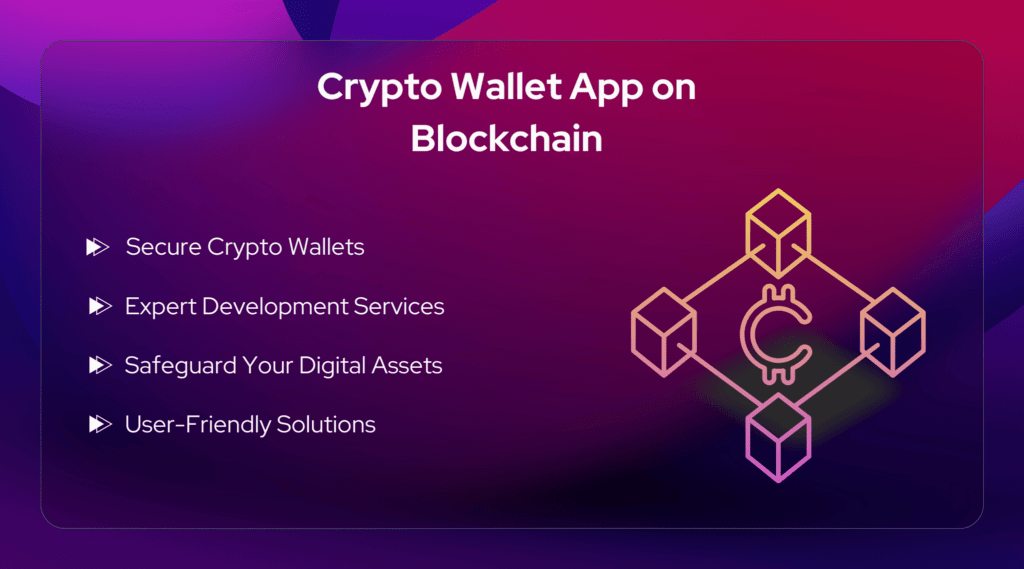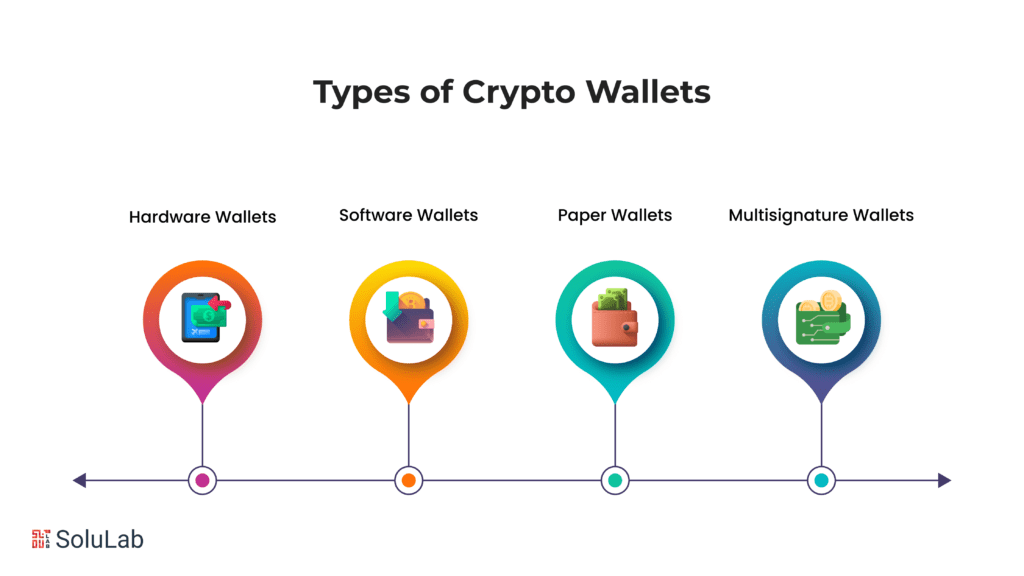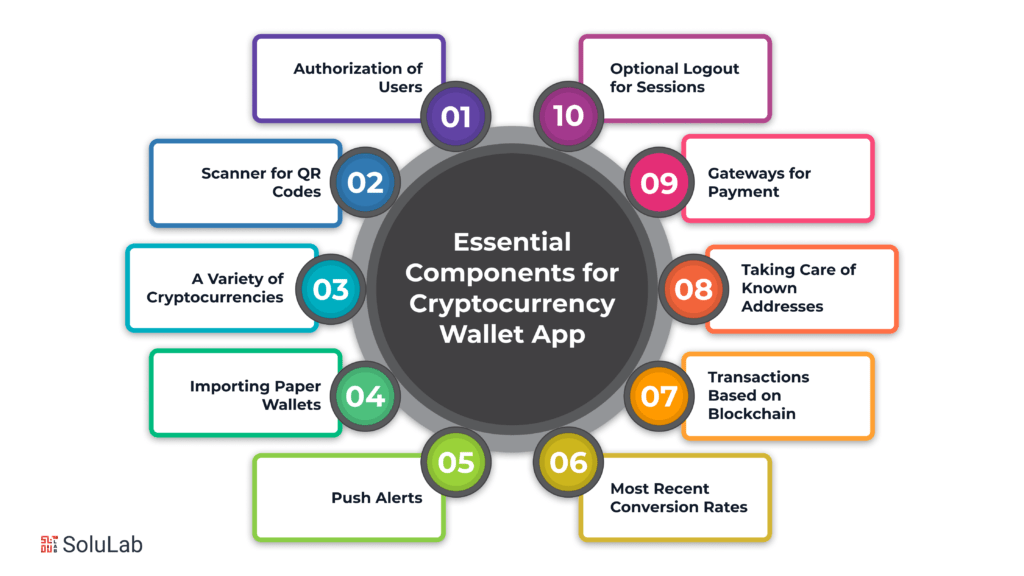
In the world of cryptocurrencies, accessibility and security are the pillars that support prosperous businesses. Reliable storage solutions are in high demand as digital assets continue to grow in prominence. A key component of blockchain technology, the cryptocurrency wallet software is at the center of this digital revolution. This thorough book will take you on a tour through the world of cryptocurrency wallets, revealing its nuances, exploring the many kinds that are out there, and illuminating the fundamentals of developing an app for one.
Let’s start by defining what crypto wallet actually are. These virtual tools essentially serve as digital vaults, protecting private keys, which are the entry points for accessing and handling Bitcoin assets. Modern encryption techniques are used by these wallets to safeguard users’ money from
What is a Crypto Wallet?
A crypto wallet aids users in storing, sending, and receiving Bitcoin much like any other digital wallet. It is a piece of software that records cryptocurrency transactions (buying, selling, and lending) and saves the virtual currency safely. A crypto wallet is simple to download and set up on a smartphone or other suitable device.
The cryptocurrency wallets work as follows:
To deal with cryptocurrency, you need two things: your private key and your wallet address, which is sometimes referred to as your public key. An analog of a public key would be your bank account number. To transfer or receive money, you can give out your bank account number to other individuals or organizations. In a similar vein, you may obtain the cryptocurrency by sharing your public key, which is the address of your wallet. Like your debit card PIN or bank account password, your crypto wallet’s private key is private and protected. Sharing your PIN with random people would allow them to access your bank account directly, therefore you wouldn’t want to do that. The password that grants access to your cryptocurrency is called a private key.
Types of Crypto Wallets

1. Hardware Wallets: These are actual gadgets that store your cryptographic money disconnected, giving an additional layer of safety. Models incorporate Record Nano S and Trezor.
2. Software Wallets: Programming wallets come in different structures, including work area, versatile, and online wallets. They are available through applications or web interfaces and can be additionally arranged as:
- Desktop Wallets: Installed on a desktop or laptop computer, examples include Exodus and Electrum.
- Mobile Wallets: Designed for smartphones, offering convenience and accessibility on the go. Popular options include Trust Wallet and Coinbase Wallet.
- Online Wallets: Web-based wallets are accessible via internet browsers. While convenient, they may be more susceptible to hacking. Examples include MyEtherWallet and MetaMask.
3. Paper Wallets: A paper wallet includes printing your private and public keys on a piece of paper, giving a disconnected stockpiling choice. It’s viewed as perhaps the most reliable strategy whenever put away appropriately.
4. Multisignature Wallets: These wallets require numerous confidential keys to approve an exchange, upgrading security by circulating control among different gatherings.
Crypto Wallet App Development
Creating a crypto wallet application is a painstaking process that combines user-centered design with sophisticated technological aspects. Let’s examine each phase in further depth:
-
Recognize cryptocurrencies and blockchain
The development of cryptocurrency apps heavily relies on blockchain technology. You must first learn about blockchain technology applications and cryptocurrencies if you want to develop an app for a crypto wallet. The Internet makes e-mails feasible, and blockchain is a breakthrough and exciting technology that makes digital currency (cryptocurrencies) function. A blockchain, as its name implies, is a series of blocks that are connected by a cryptographic concept. The blocks in the chain contain digital information or data. Allowing the safe sharing of important data is the main goal of utilizing it.
-
Employ Conventional Cryptocurrency
Since most cryptocurrencies are transparent, developers may use open-source tools and frameworks. The cross-platform Java library Coinbase SDK is compatible with Python, Java, and Ruby and allows the building of Bitcoin wallets for iOS and Android. With the help of the well-known BitcoinJ SDK and its extensive documentation, developers may work with JVM languages like Python, C++, JavaScript, and Ruby. Developers may avoid starting from scratch and gain from pre-built functionality and community assistance by using these existing libraries.
-
Make Use of APIs
Building a feature-rich Bitcoin wallet software is made possible by using APIs. You may simply synchronize your cryptocurrency wallet with the blockchain ecosystem by using a distributed ledger API. The most well-known APIs available to you are Factom, SimpleSwap, Bitcore, and Coinbase. Your development team may expedite the app development process by using the APIs to accomplish the required processes quickly. Additionally,
-
Utilise Cloud
You need to choose the appropriate cloud platforms for your application at this point. If you decide to pursue web development, PaaS (Platform-as-a-service) is an option. However, in order to design an app for a cryptocurrency wallet, you must find a BaaS (Blockchain as a Service) provider and include their cloud service into your program. Businesses like Microsoft, Amazon, and Azure provide BaaS products. You may create a safe Bitcoin wallet app using either of them, depending on your needs and preferences.
-
Choose the Appropriate Technology Stack
Your app will achieve the necessary success with the correct technological stack. For instance, you may use HTML5, CSS3, and either Node.js or Angular.js to create a web application. You can build a scalable crypto web application with the aid of this. You have two options when creating a native Android app: Kotlin or Java. Additionally, Objective-C or Swift may be utilized for iOS apps.
-
Stress Security
When developing an app for a Bitcoin wallet, security is crucial. For this reason, you should make sure that the security of your cryptocurrency app is excellent. You may think about including hardware authentication, face ID, and fingerprint authentication in the crypto wallet app in addition to 2FA. Continued security upgrades must be made guaranteed of by the developers. If there are any problems, they need to find them fast and use the newest tech to address them along with any other security concerns.
-
Look Into Your Rivals
You obviously want your cryptocurrency wallet software to stand out from the competition. For this reason, it’s critical to monitor your rivals. Recognize their actions and the technology they have used. To find out what special features you may incorporate into your app, go through the features. Recall that in order to get a competitive advantage over others, you need to be aware of what’s going on in your surroundings.
-
Start Working on Your App Development
Thus, when you’re ready to begin developing the crypto wallet app, be sure to perform the following:
- Choose every feature your app will have.
- After writing the application code, connect it to your database.
- Create an intuitive and basic user interface.
- Make sure you test your wallet thoroughly before releasing it.
Essential Components for Your Cryptocurrency Wallet App

You need to integrate your business logic needs with improved functionality in your Bitcoin wallet software. These are the qualities that your cryptocurrency wallet software has to include.
1. Authorization of Users
Wallet applications are vulnerable to numerous security breaches due to the widespread use and high value of cryptocurrencies. That is why it is always preferable to utilize two-factor or multi-factor authentication (2FA or MFA) to improve user authentication of your crypto wallet app. Many traditional non-crypto apps lack the extra degree of protection that 2FA or MFA gives. This is done to further strengthen the security of wallet access in addition to your login and password.
2. Scanner for QR Codes
Your crypto wallet app transactions will be faster, more convenient, simpler, and more secure with the help of a QR Code Scanner tool. The automated scanning of the public keys and wallet address can be facilitated by your crypto wallet app if it has a QR code scanner integrated. With only one click, it thereby improves Bitcoin transfers. Therefore, the app user may scan the QR code and the information is retrieved through the scanner, saving them the trouble of inputting all the lengthy characters of the public keys one at a time. It is a secure and safe method of transacting with cryptocurrencies. This functionality is recommended because, without it, app users would have to write lengthy wallet address characters, increasing the likelihood that they may miss anything.
Related: How AI and Blockchain are Shaping the Future of QR Codes?
3. A Variety of Cryptocurrencies
Multi-cryptocurrency support is required for your wallet. The reason behind this is that several currencies are periodically added, and their values are always fluctuating. Thus, you shouldn’t retain a lot of different wallets to hold your cryptocurrency. Would you agree? Thus, you should be able to easily transact with multiple currencies using your Bitcoin wallet app.
4. Importing Paper Wallets
Users of your app must be able to transfer and receive cryptocurrency by scanning a paper wallet with a QR code.
5. Push Alerts
The ability for consumers to get push alerts is crucial for keeping them informed about cryptocurrency transactions at all times. Users of your cryptocurrency application will receive notifications on the value of their digital currency, successful and unsuccessful transactions, and other related information using this feature. This function may guarantee that you receive real-time notifications for any transaction made on your account.
6. Most Recent Conversion Rates
Without access to and the ability to calculate transaction fees based on constantly fluctuating exchange rates, no Bitcoin wallet app is complete. This is so that the user of the crypto wallet software may trade money in a variety of ways, such as between fiat and digital currencies or even between the same and other digital currencies. They will definitely need to be informed of the most recent currency value in real time for this to happen.
7. Transactions Based on Blockchain
Blockchain technology is revolutionary and should be the foundation of your crypto wallet development companies. It will enable your users to send and receive virtual currency quickly and completely tamper-proof through your crypto application. They can also see the whole transaction history and their available balance. This is so because the blockchain network receives a transmission of every completed transaction.
8. Taking Care of Known Addresses
This feature gives your users a way to manage all of their regularly used addresses, which should make the transaction process a whole lot faster, smoother, and more comfortable.
9. Gateways for Payment
Your app’s integrated payment gateway can make it easier for users to acquire or trade digital assets.
10. Optional Logout for Sessions
This is a great addition to your app’s security features. With this setup, users who are not using the app for an extended period of time will automatically be logged out and will need to re-login.
Conclusion
In summary, a combination of technological expertise, caution, and understanding is needed to successfully navigate the world of cryptocurrencies. It is impossible to overestimate the significance of safe and intuitive crypto wallet software as digital assets continue to change the financial environment. Protecting your digital fortune requires that you comprehend the principles of cryptocurrency wallet construction, regardless of your level of experience as a trader or investor.
Working with a trustworthy crypto development company like SoluLab might make all the difference when starting your path into cryptocurrency wallet development. With a team of knowledgeable crypto wallet developers and state-of-the-art services, SoluLab enables both people and companies to fully use blockchain technology. SoluLab’s experience guarantees the development of custom crypto wallet solutions catered to your particular requirements, from conception to implementation.
You can rely on SoluLab to be your lighthouse when it comes to developing cryptocurrency wallets in a quickly changing world where security and innovation are paramount. Let’s work together to create a future where digital assets are precisely and carefully protected, not merely stored. With SoluLab at your side, embrace the potential of cryptocurrency wallets and set out on a path to financial independence.
FAQs
1. What is a crypto wallet?
A crypto wallet is a digital tool that allows users to store, send, and receive cryptocurrencies securely. It consists of a pair of cryptographic keys: a public key for receiving funds and a private key for accessing and managing those funds.
2. What are the different types of crypto wallets?
There are several types of crypto wallets, including hardware wallets (e.g., Ledger Nano S), software wallets (e.g., Trust Wallet), paper wallets, and multi-signature wallets. Each type offers varying levels of security and accessibility to suit different user preferences.
3. How does crypto wallet development ensure security?
Crypto wallet development involves implementing robust security measures such as encryption, two-factor authentication (2FA), biometric authentication, and secure key storage. Additionally, adherence to industry best practices and regular security audits help mitigate risks and safeguard users’ funds.
4. What factors should I consider when choosing a crypto wallet development company?
When selecting a crypto wallet development company, consider factors such as their expertise in blockchain technology, track record of successful projects, adherence to security standards, and ability to deliver customized solutions tailored to your specific requirements.
5. Can I use the same crypto wallet for different cryptocurrencies?
Some crypto wallets support multiple cryptocurrencies, while others are designed for specific digital assets. It’s essential to choose a wallet that is compatible with the cryptocurrencies you intend to store or transact with.
6. How long does it take to develop a custom crypto wallet app?
The timeline for developing a custom crypto wallet app depends on various factors, including the complexity of the project, desired features, platform(s) for development (e.g., iOS, Android, Web), and the development company’s resources and expertise. Typically, development timelines can range from several weeks to a few months.
7. What ongoing maintenance and support services are offered for crypto wallet apps?
A reputable crypto wallet development company should provide ongoing maintenance and support services to ensure the continued functionality, security, and performance of the wallet app. This may include regular updates to address security vulnerabilities, bug fixes, feature enhancements, and technical support for users.





